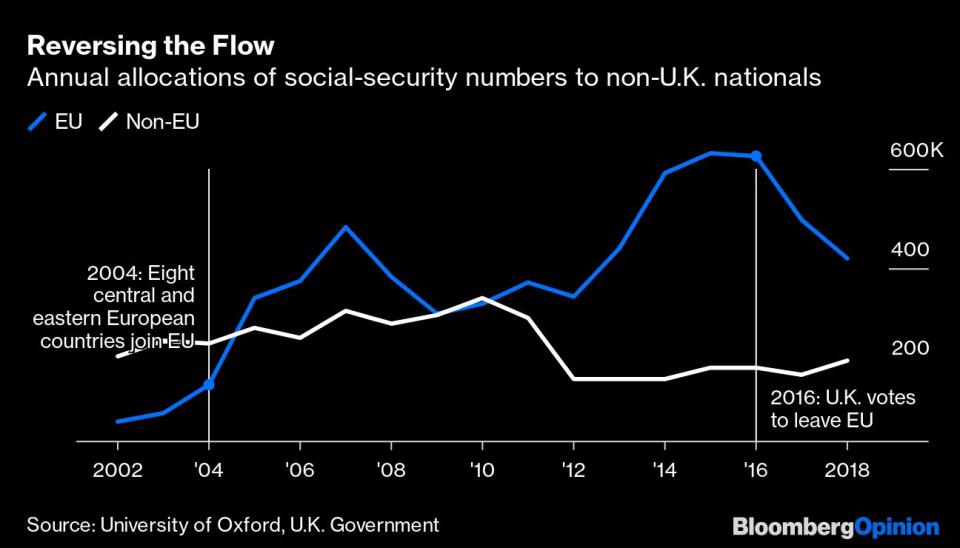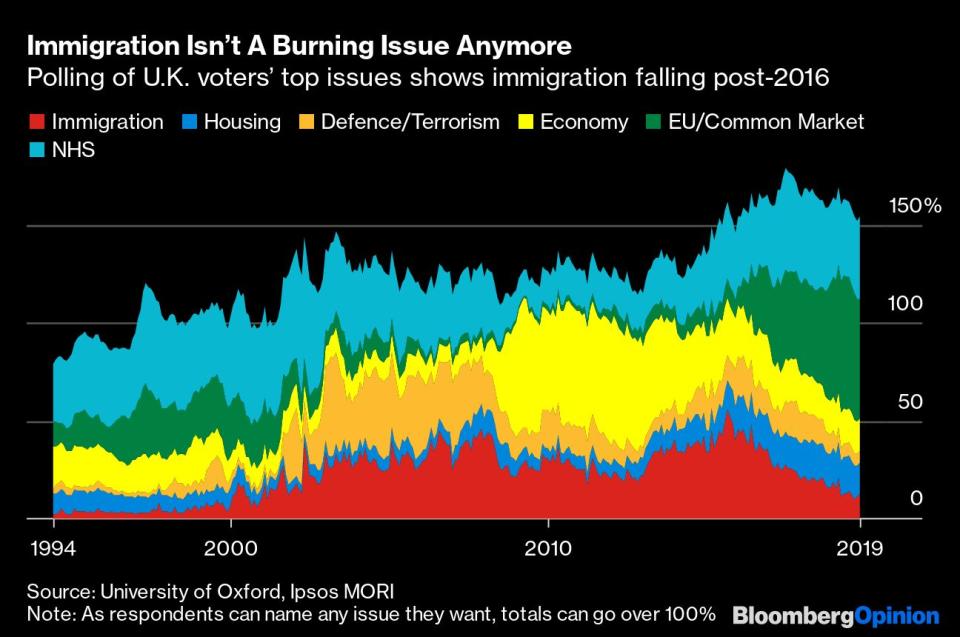Boris Johnson and Priti Patel Are Immigrants Too
(Bloomberg Opinion) -- The children of immigrants aren’t happy about immigration.
Donald Trump’s German-born grandfather came to America illegally as a teenager at the end of the 19th century, a fact he doesn’t mention when threatening to deport millions of undocumented migrants. Britain’s exit from the European Union’s free-movement area was championed by Boris Johnson, a U.S.-born descendant of an Ottoman-Turkish minister. And the U.K.’s new stricter points-based immigration system, favoring specific skills, is to be run by Home Secretary Priti Patel, whose Ugandan-born parents arrived in the country with “nothing.”
While it’s tempting to paint them as hypocrites stoking up fear — Johnson was happy to champion immigrants when he was London mayor — things aren’t always so clear cut.
As frustrating as it may be for immigrants like myself who fall foul of or disagree with their policies, the likes of Johnson and Patel seem in sync with many of their fellow citizens. Leaving the EU and introducing new immigration curbs were two campaign pledges that won their party a parliamentary majority in December. One YouGov survey conducted this week found that 48% of Brits believed the level of U.K. immigration was “too high,” versus 33% who thought it “about right” and 6% “too low”. Another found that 83% of Brits believed migrants should have to learn the language of their host country. Yet U.K. attitudes to immigration are softer than in most EU nations:
The politics of immigration, like the politics of trade, reflects a desire for more control from what the British writer David Goodhart calls the “Somewheres” — people with a rooted identity, a lack of geographic and social mobility and fewer professional qualifications. The city-hopping “Anywheres” are on the back foot.
The divide highlights the winners and losers of globalization. Lower barriers to trade and immigration have been good for the economy overall, as work by economists such as Jonathan Portes shows, leading to cheaper, more efficiently produced goods and nearly full employment in the U.K. But more competition has also created strains at the margins. A London-centric, low-wage, service-dominated economy has fueled national resentment and pushed politicians to “take back control” of immigration policy, whatever the cost.
With Brexit achieved, and free EU movement about to come to an end, it feels like a large part of the debate is over. After a decade-long surge in EU migration to the U.K., migrants are starting to go home. The issue isn’t as high a priority for Brits as it used to be, even if it’s still an emotive subject.
But the debate over controlled immigration is only just beginning. Johnson and Patel’s ruling Conservatives reckon their new system will bring down overall net migration, thereby calming voter anger. Only by doling out more points to highly skilled, better paid workers who speak English, the thinking goes, will British workers avoid competing with low-wage EU rivals.
Yet at the same time, the U.K. will have to make sure immigrants do keep coming to help the economy and its ageing population — through tax receipts, staffing the National Health Service, providing seasonal labor for agriculture, filling skills gaps, and more.
It’s hard to see how Johnson can square this circle. The points aren’t given generously — some 70% of EU migrants wouldn’t make the cut. (Yours truly, fresh out of college, wouldn’t have made it either). That’s a huge gap to fill in less than a year for the U.K.’s 800,000 young people not in work currently. Their pride might be stung if it turns out that raising barriers to entry means a wider gulf between well-remunerated foreigners and badly paid natives doing the menial stuff.
Given the worries about whether there are enough Brits who want to do these jobs, there are already exemptions brewing for several sectors that would barely function without migrant workers, including the NHS and farming.
And it’s not as if central government has a great record of managing such huge policy shifts. The Home Office has already run into various administrative and bureaucratic issues since Brexit. It may be overwhelmed.
This is only the beginning of a long process, however. For the first time in decades the U.K. is actually debating how to manage the entirety of its immigration policy, and the “Anywheres” should jump at the chance to take part. Hassan Damluji, author of “The Responsible Globalist,” argues convincingly that those who believe in immigration’s benefits and support the EU as a multilateral bloc should still respect the role of the nation as a preeminent actor, and stop always obsessing about the economy and belittling those who feel short-changed by mass migration.
Witness the bizarre efforts in the European Parliament to grant “associated citizenship” to Brits, a concept that is both goofy and irresponsible. Time would be better spent trying to make sure students and asylum seekers get preferred treatment when coming into Britain.
We shouldn’t be blind to the dangers of a world retrenching to national borders: The last comparable wave of globalization happened at the turn of the 20th century and was ultimately halted by war. But for as long as the “Somewheres” are willing to debate, the “Anywheres” should listen and respond with intelligence.
To contact the author of this story: Lionel Laurent at llaurent2@bloomberg.net
To contact the editor responsible for this story: James Boxell at jboxell@bloomberg.net
This column does not necessarily reflect the opinion of Bloomberg LP and its owners.
Lionel Laurent is a Bloomberg Opinion columnist covering Brussels. He previously worked at Reuters and Forbes.
For more articles like this, please visit us at bloomberg.com/opinion
Subscribe now to stay ahead with the most trusted business news source.
©2020 Bloomberg L.P.

 Yahoo Finance
Yahoo Finance 


